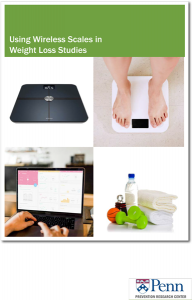Dec 19, 2016
 In a recent Fox News Health report, UPenn PRC Community Engagement Core Lead Carolyn Cannuscio ScD, shed light on the role modern-day libraries can play as multi-faceted community resource centers. “Some people would argue that libraries are old-fashioned, outmoded institutions that are irrelevant in the digital age,” said Cannuscio, a social epidemiologist at the University of Pennsylvania in Philadelphia. “Our work shows very clearly that libraries are vital, dynamic organizations that know their patrons well and respond creatively to community needs.”
In a recent Fox News Health report, UPenn PRC Community Engagement Core Lead Carolyn Cannuscio ScD, shed light on the role modern-day libraries can play as multi-faceted community resource centers. “Some people would argue that libraries are old-fashioned, outmoded institutions that are irrelevant in the digital age,” said Cannuscio, a social epidemiologist at the University of Pennsylvania in Philadelphia. “Our work shows very clearly that libraries are vital, dynamic organizations that know their patrons well and respond creatively to community needs.”
Through the Healthy Library Initiative, Cannuscio and fellow PRC Researchers David Grande, MD, MPA, and Heather Klusaritz, PhD, MSW identified ten programs aligned with the Free Library of Philadelphia which address social determinants of health within the Philadelphia community. After conducting interviews, the researchers found that libraries provided a safe space, for especially vulnerable populations which include “homeless people, people with mental illness and substance use, recent immigrants, and children and families suffering from trauma.”
In this new model, librarians assist with employment searches, applications for health insurance, and support other helpful programs such as classes on nutrition and youth leadership. The 54 libraries across the city of Philadelphia see 5.8 million in-person and 9.9 million online visits annually. Cannuscio emphasizes the importance of having a space that provides shelter and services without any charge.
Read more about the study in Health Affairs.
Nov 30, 2016
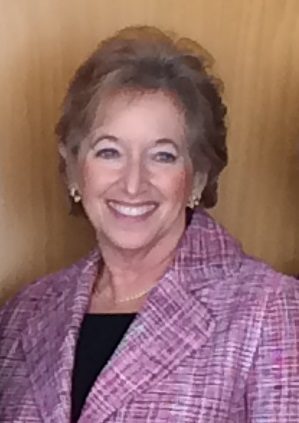 UPenn PRC Director and Penn Integrates Knowledge Professor Karen Glanz, PhD, is tackling the stigma associated with prostate cancer in a new project with collaborator Neha Vapiwala, MD, Penn associate professor of radiation oncology. Building on the 2015 UPenn PRC Prostate Cancer Evidence Academy conference, Glanz and Vapiwala seek to empower prostate cancer patients with information and support that will help them with decision making about their medical and treatment choices. “The conference was a first venture of its kind for us,” Glanz says. “Out of that came some clear needs, and some of them really converged with what Neha had noticed in her clinic.”
UPenn PRC Director and Penn Integrates Knowledge Professor Karen Glanz, PhD, is tackling the stigma associated with prostate cancer in a new project with collaborator Neha Vapiwala, MD, Penn associate professor of radiation oncology. Building on the 2015 UPenn PRC Prostate Cancer Evidence Academy conference, Glanz and Vapiwala seek to empower prostate cancer patients with information and support that will help them with decision making about their medical and treatment choices. “The conference was a first venture of its kind for us,” Glanz says. “Out of that came some clear needs, and some of them really converged with what Neha had noticed in her clinic.”
The project, funded in part by the Prostate Cancer Foundation, was inspired by a health-conscious, African-American, 40-something patient of Vapiwala’s who was unaware a man his age could get prostate cancer. The researchers envision a train-the-trainer type program. Phase one, in process, is four focus groups composed of African Americans and Latinos, two high-risk populations. Part two will include creating mini-curricula and working with community organizations to select the trainers. Glanz and Vapiwala believe their approach may be applicable to other diseases. “We’re using prostate cancer as a model,” Vapiwala says. “You could insert cervical cancer, diabetes, or any number of health conditions associated with stigma, fear, and mistrust.”
Read more about the project in Penn Current.
Aug 2, 2016
 Writing in the Philadelphia Inquirer about a loophole in the Affordable Care Act which disadvantages those who need colorectal cancer screening most, PRC Researcher Chyke A. Doubeni, MD, suggests that “this unfortunate scenario occurs in part because the U.S. Congress unfairly limits the ability of low-income Medicare beneficiaries to receive screening. This compounds other barriers and perpetuates long-standing disparities in mortality from colon cancer for seniors.”
Writing in the Philadelphia Inquirer about a loophole in the Affordable Care Act which disadvantages those who need colorectal cancer screening most, PRC Researcher Chyke A. Doubeni, MD, suggests that “this unfortunate scenario occurs in part because the U.S. Congress unfairly limits the ability of low-income Medicare beneficiaries to receive screening. This compounds other barriers and perpetuates long-standing disparities in mortality from colon cancer for seniors.”
Doubeni notes that misclassifiying colonoscopy as a “one-time activity” rather than including it in the screening menu of “a series of clinical activities involved in identifying and testing patients and performing diagnostic confirmation when necessary” makes the test available only to Medicare patients who can afford supplemental policies.
Jul 27, 2016
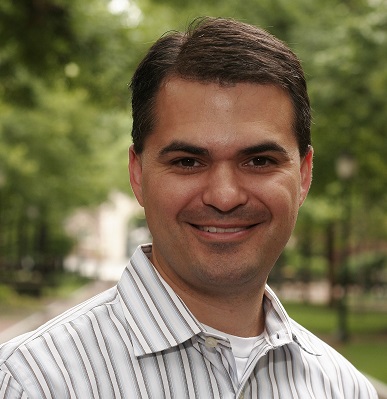 In philly.com’s Health Cents blog, PRC Researcher David Grande, MD, MPA, looks at the complexities of shopping for health care. Grande shares his own family’s experience of trying to make the right – and affordable – decisions in an urgent care crisis to exemplify how difficult it is to collect information about medical expenses and choices, especially from insurance providers.
In philly.com’s Health Cents blog, PRC Researcher David Grande, MD, MPA, looks at the complexities of shopping for health care. Grande shares his own family’s experience of trying to make the right – and affordable – decisions in an urgent care crisis to exemplify how difficult it is to collect information about medical expenses and choices, especially from insurance providers.
Jul 19, 2016
 On NPR’s Health News, PRC Director, Kevin Volpp, MD, discussed new strategies for changing health behaviors.
On NPR’s Health News, PRC Director, Kevin Volpp, MD, discussed new strategies for changing health behaviors.

Volpp suggests that “commitment contracts” produce better results than traditional workplace rewards programs when it comes to tying financial incentives to goals. Reward programs usually offer a lump payment at the end of a full year. Commitment contracts involve an upfront investment which participants recoup if they meet self-designed goals and forfeit if they do not. Volpp and colleagues at the Center for Health Incentives and Behavioral Economics have found that short-term goals are more successful than long-term, when it comes to health behavior changes, and that immediate financial loss has greater impact than far-in-the-future financial gain.
Jul 11, 2016
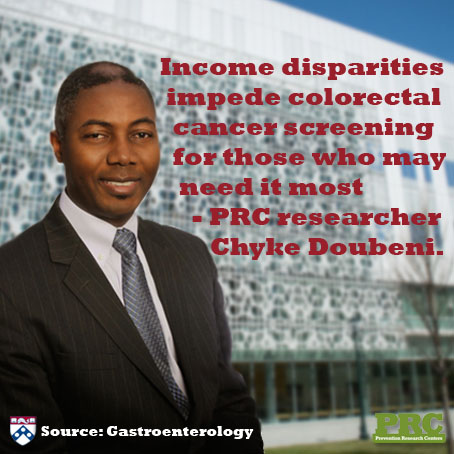
In the May 2016 issue of Gastroenterology, UPenn PRC Researcher Chyke Doubeni examines the barriers to screenings which provide early identification and prevention of colorectal cancer for low-income patients. Colorectal cancer is the second leading cause of cancer death in the United States; about 70% of those deaths occur in Medicare age-eligible patients.
Doubeni reviews the Affordable Care Act provisions intended to benefit low-income patients and examines why providers’ interpretations of those benefits have lead to confusion about insurance status of patients, insurance coverage for different steps of screening procedures, and reimbursement expectations. Doubeni’s recommendations include Congressional action to amend and clarify the provisions.
Jun 22, 2016

In The Financial Rewards of Working Out section of Money magazine’s Get Healthy, Get Wealthy issue, PRC Director Kevin Volpp shares his research on the role wearable fitness devices play in motivating people to start or improve an exercise routine.
“The devices may appear to be incentivizers,” Volpp says, but “once the novelty wears off, many people stop using them.”
Jun 21, 2016

As a guest on Knowledge@Wharton radio, UPenn PRC Director Karen Glanz evaluated the health and financial implications of the Philadelphia’s new “soda tax” passed by City Council on June 16, 2016.
According to Glanz, while a difference in consumption could be seen within a year or two of implementation, the tax’s impact on disease risk factors may not be evident for another three to five years.
Jun 15, 2016
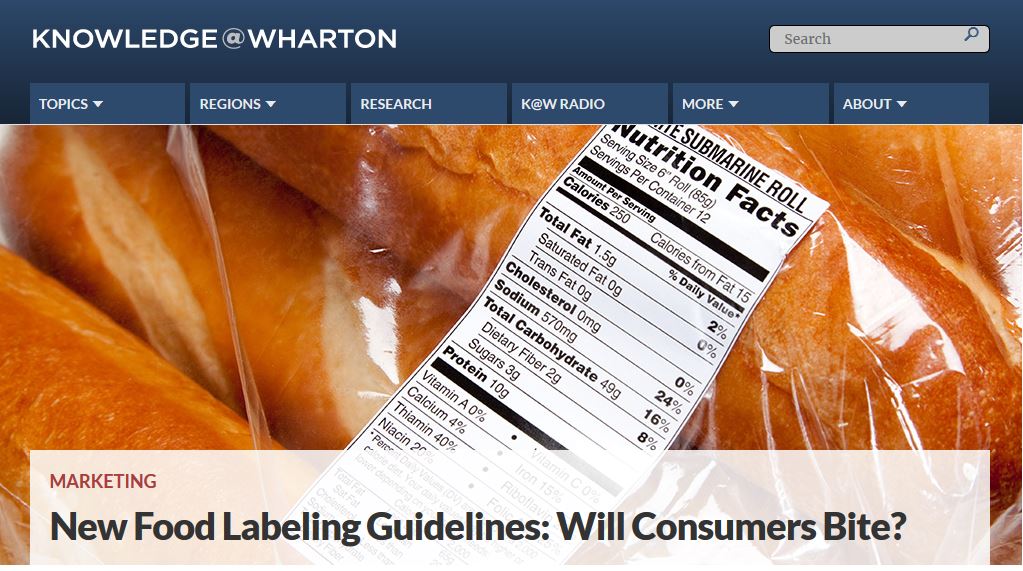
UPenn PRC Director, Karen Glanz, PhD, and Wharton marketing professor, Jason Riis discussed the new Federal food labeling guidelines on the June 13, 2016 edition of Knowledge@Wharton.
Observing that past labeling revisions often were driven by a single concern, such as trans fats or sugar, Glanz sees the shift towards a more comprehensive approach to portion sizes and total calorie intake as beneficial . “If these labels can nudge things in that direction and/or nudge the industry to reformulate the foods that will be less high-calorie, then that could move things without necessarily depending on people’s conscious decision-making,” she said.
“That all hinges on whether people actually read it and understand it, and whether it is easy to see and digest,” Glanz said. Displaying the nutrition information on the front of packs ensures that “consumers don’t have to turn the pack around to see that, or bring out their reading glasses,”
May 23, 2016

In a New York Times Sunday Review article on the growing pains of the Affordable Care Act, Daniel Polsky is cited for advancing research into how the health care law affects patients’ access to care. “We hear lots of complaints, but we really don’t know the extent of the problem because there’s still very little data,” the article quotes Polsky.
Polsky is collecting such data in the Narrow Networks Project for the purpose of analyzing the access patterns of the health coverage offered by insurers participating in the ACA’s exchanges or marketplaces across the country. Dr. Polsky is a PRC Researcher and Executive Director of Penn’s Leonard Davis Institute of Health Economics.
Apr 18, 2016
 Carmen Guerra, MD., MSCE, a Co-Investigator on the UPenn PRC Cancer Prevention & Control Research Network Center, was profiled in Al Dia News’ “Meet the Latino Doctors of 2016”. Dr. Guerra is Associate Professor of Medicine at the Perelman School of Medicine at the University of Pennsylvania and the Associate Director of Diversity and Outreach at the Abramson Cancer Center of the University of Pennsylvania. Her research work focuses largely on cancer screening and prevention in vulnerable populations.
Carmen Guerra, MD., MSCE, a Co-Investigator on the UPenn PRC Cancer Prevention & Control Research Network Center, was profiled in Al Dia News’ “Meet the Latino Doctors of 2016”. Dr. Guerra is Associate Professor of Medicine at the Perelman School of Medicine at the University of Pennsylvania and the Associate Director of Diversity and Outreach at the Abramson Cancer Center of the University of Pennsylvania. Her research work focuses largely on cancer screening and prevention in vulnerable populations.
The article is the first in a series on Latino leaders in Southeastern Pennsylvania. AlDiaNews.com is the national news website of the Delaware Valley-circulated Al Día Spanish/English language newspaper.
Mar 29, 2016
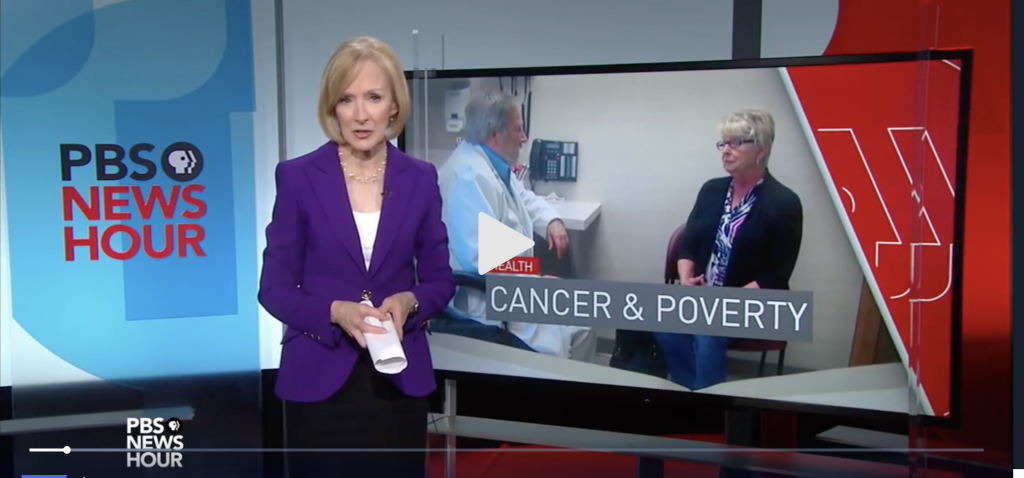
Our fellow Prevention Research Center at the University of Kentucky, the Rural Cancer Prevention Center, was featured in an important story on the challenges of tackling cancer in rural Kentucky. The feature airs on PBS’s NewsHour on Friday, March 26, 2016. The Rural Cancer Prevention Center is credited with advancing cancer screening and education in some of the poorest regions of the state.
See the story here:
https://www.pbs.org/newshour/show/why-cancer-is-so-hard-to-fight-in-rural-kentucky
 In a recent Fox News Health report, UPenn PRC Community Engagement Core Lead Carolyn Cannuscio ScD, shed light on the role modern-day libraries can play as multi-faceted community resource centers. “Some people would argue that libraries are old-fashioned, outmoded institutions that are irrelevant in the digital age,” said Cannuscio, a social epidemiologist at the University of Pennsylvania in Philadelphia. “Our work shows very clearly that libraries are vital, dynamic organizations that know their patrons well and respond creatively to community needs.”
In a recent Fox News Health report, UPenn PRC Community Engagement Core Lead Carolyn Cannuscio ScD, shed light on the role modern-day libraries can play as multi-faceted community resource centers. “Some people would argue that libraries are old-fashioned, outmoded institutions that are irrelevant in the digital age,” said Cannuscio, a social epidemiologist at the University of Pennsylvania in Philadelphia. “Our work shows very clearly that libraries are vital, dynamic organizations that know their patrons well and respond creatively to community needs.”
 UPenn PRC Director and Penn Integrates Knowledge Professor
UPenn PRC Director and Penn Integrates Knowledge Professor  Writing in the
Writing in the  In philly.com’s
In philly.com’s 






 Carmen Guerra, MD., MSCE, a Co-Investigator on the
Carmen Guerra, MD., MSCE, a Co-Investigator on the 
